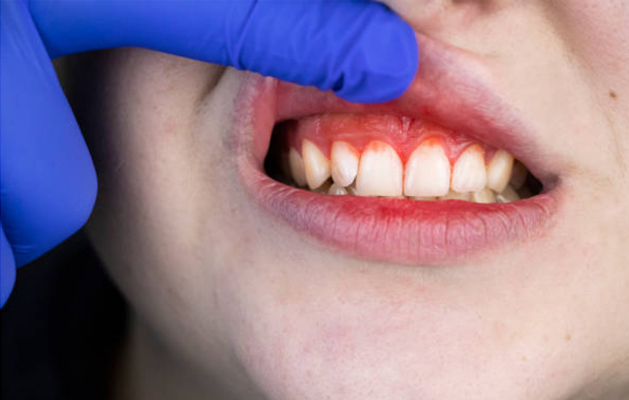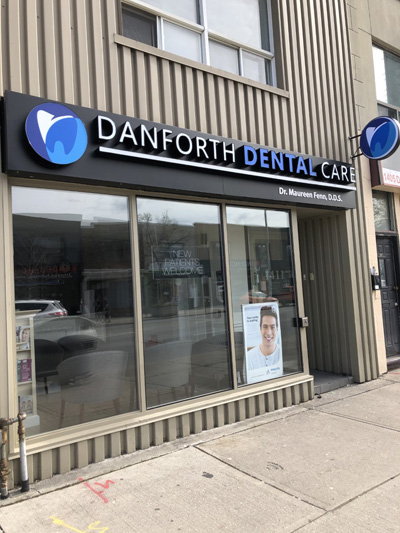What is the Role of Periodontics In Dentistry?
Exploring an area of dentistry that focusses on gum health
Periodontics is the branch of dentistry that deals exclusively with the health of the gums, or more specifically, the inflammatory disease that is destructive to the gums and other support-ing structures surrounding the teeth.
This area of dental care requires a thorough understanding of the gums and how to treat gum disease-related conditions. Dr. Maureen Fenn has extensive experience with diagnosing and treating periodontal issues using the most current techniques and technological devices at our Danforth dental clinic - and also has training in the surgical placement, maintenance and repair of restorative dental implants.
Periodontics includes the treatment of mild to advanced cases of gum disease.
Periodontal disease is an oral health condition that causes inflammation of the supporting tis-sues of the teeth, including the gums and bone. When the harmful plaque bacteria around the gum line is not properly removed through regular cleaning, gum disease can (and will) strike.
There are two different stages of gum disease, beginning with the milder “gingivitis”, and ad-vancing to a more aggressive “periodontitis” if neglected.
Periodontal disease can usually be quite easily treated in its early stage (gingivitis).
Treatment for less advanced stages of gum disease includes making necessary changes to at-home oral hygiene practices, as well as seeing the hygienist for a scaling and root planing. This form of treatment is essentially a deep dental cleaning where stubborn accumulations of plaque and tartar are removed from the areas below the gum line.
For more advanced forms of periodontal disease (periodontitis), more aggressive means of treatment are necessary.
This includes pocket reduction surgery, also known as a gingivectomy, osseous surgery and flap surgery, which is often performed for patients with periodontitis. With this procedure, a surgi-cal treatment approach is taken to eliminate harmful bacteria that is trapped in the spaces (or pockets) between the gums and teeth.
Another surgical procedure that is often necessary to be combined with pocket reduction is a gum grafting procedure, performed to restore areas of the gum that have receded or been lost due to periodontal disease. With this surgery, gum tissue is harvested from another area of a patient’s mouth (such as the roof), used to restore the affected areas where gum meets the teeth. This procedure helps to address the problem of exposed tooth roots, as wel
As gum grafting addresses gum tissue loss, a bone grafting procedure is carried out to address instances of bone loss that occur with advanced gum disease. This procedure is commonly performed prior to a dental implant surgery, in order to provide a more stable support for the restoration.
Am I at risk for periodontal disease?
Everyone is at risk for gum disease, but some people are more susceptible than others. The good news is, you can work to change what you can to reduce your risk. Risk factors for gum disease include smoking or using tobacco, poor nutrition, heredity, age, certain medications or health conditions, being pregnant, and a habit of grinding or clenching the teeth.
Your smile will surely appreciate any change you can make to your lifestyle or habits. The best preventive action to take is to be consistent and thorough with your dental care routine and to eat a healthy, balanced diet. Make sure you properly brush twice daily, and floss once a day. Additionally, if you’re finding that certain habits such as smoking/chewing tobacco are a challenge for you to change, speak with a health care professional.
Furthermore, be sure to never miss a routine check-up and cleaning appointment with your dentist and hygienist, as these interval maintenance visits (recommended every 6 to 9 months) go a long way in helping to keep your smile optimally clean while also catching oral issues early, before more extensive treatment may be required.
As the primary cause of tooth loss, it’s important to do your best every day to prevent periodontal disease.
If you’ve been suffering from the signs of gum disease, it’s up you to book an appointment as soon as you can. Our dentist will know how to evaluate and treat your gums condition.
Whether you’ve been dealing with periodontal troubles, or it’s simply time to book your next routine visit, reach out to our expert team at Danforth Dental Care today!


We are conveniently located near Greektown on the TTC Danforth Avenue subway line between Greenwood Avenue and Coxwell Avenue.
1411 Danforth Avenue, Toronto, ON M4J 1N2